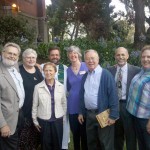The work of Extraordinary Lutheran Ministries grew out of the work of two previous organizations, Lutheran Lesbian & Gay Ministries (founded in 1990) and the Extraordinary Candidacy Project (founded in 1993).
Early in 2006, a group of representatives from LLGM and ECP formed a vision team to begin discussing a merger. On February 17, 2007 , the leaders of Lutheran Lesbian & Gay Ministries and the Extraordinary Candidacy Project formally agreed to merge, forming a new organization. The leadership approved a vision document and created a team to draft a theology statement. Extraordinary Lutheran Ministries was founded on October 31, 2007.
Brief History and Purpose of Lutheran Lesbian & Gay Ministries (LLGM)
LLGM was founded in 1990 when two San Francisco congregations of the Evangelical Lutheran Church in America (ELCA) decided to call and ordain a gay man and a lesbian couple to be their pastors in violation of a church policy that prohibiting gay, lesbian and bisexual (with a same gender partner) pastors from serving its congregations unless they agreed to life long celibacy. These congregations not only believed that this policy was unjust, but also that it was critical for their credibility, integrity and evangelism that their congregations be served by openly identified sexual minority pastors who fully lived or endorsed same sex relationships.
These pastors were fully qualified for ministry in the Evangelical Lutheran Church in America (ELCA) but for their refusal to comply with the ELCA’s requirement of life long celibacy. The congregations that called them – St. Francis Lutheran Church and First United Lutheran Church – are diverse congregations that include all sexual orientations, ages, races, and genders.
LLGM became a model ministry demonstrating the gifts and benefits ordained leadership by sexual minority pastors bring to a congregation and community. The establishment of LLGM spurred inspiration for those seeking full inclusion of gay, lesbian, bisexual, and transgender (GLBT) people and staunch adherence to policy from the institution. After a grueling trial the St. Francis and First United were expelled from the ELCA. In subsequent years an increasing number of pastors and seminarians were being forced from Lutheran ministry in the ELCA and turned to LLGM for help.
In 1993, LLGM’s sister organization, The Extraordinary Candidacy Project (ECP) was started to provide a structure for pastors, other rostered ministers, and seminarians to gain or retain their professional credentials. The ECP provides the same strict and rigorous certification and rostering process for ministry candidates as the ELCA, but also honors relationships. In 1995 LLGM realized that at the same time there was a growing roster of ministers to serve, there were congregations interested in calling them. Therefore LLGM formally partnered with the ECP to create, facilitate, and support ministry placements for its roster and expand its work nationwide.
In 1995 LLGM awarded its first ministry partnership support. In addition, LLGM has provided emergency assistance, technical assistance and legal support to pastors, seminarians, and congregations facing discipline of negative ramifications because of their support of GLBT pastors.
Brief History and Purpose of the Extraordinary Candidacy Project

Formed in 1993, The Extraordinary Candidacy Project (ECP) was created to credential openly gay/lesbian/bisexual/transgender seminarians, candidates, ordained and commissioned ministers preparing for professional vocations in Lutheran ministry, primarily congregations of the Evangelical Lutheran Church in America (ELCA).
The Extraordinary Candidacy Project (ECP) was opposed to the Evangelical Lutheran Church in America’s (ELCA) policy of mandated celibacy for sexual minority persons who seek ordination to Word and Sacrament ministry. In part, the ECP was a project of resistance to this policy, to its lack of consistent enforcement of the policy, and to its practice of encouraging intentional deception to avoid the ramifications of the policy. ECP understood the policy to be a fundamental violation of the creation of all persons as sexual beings and of the sacredness of the primary relationships of all people.
The ECP was more than resistance. It was a new way of being church in the world. If “ordinary” had come to mean “discriminatory,” we chose the adjective “extraordinary” to deliberately emphasize the “out-of-the-ordinary” nature of our project.
The ECP candidacy process was modeled on the candidacy process of the ELCA.

